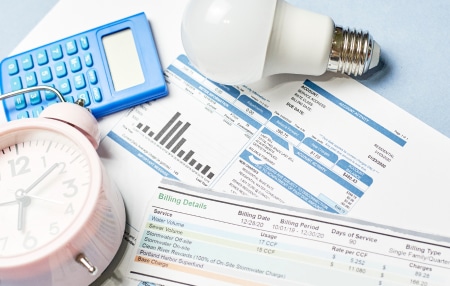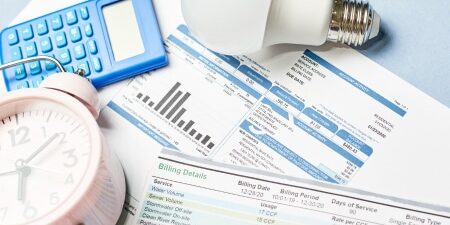
As temperatures drop, households across the UK are facing the challenge of rising energy costs. Adding to the pressure, recent changes to the Government’s Winter Fuel Payments have limited eligibility, leaving fewer people receiving support.
This year, roughly 1.5 million pensioners will qualify for the Winter Fuel Payment, almost 10 million less than previous years. To be eligible, individuals must be over the state pension age and receive specific benefits such as pension credit, income support, or universal credit.
If you find yourself struggling to pay your energy bills, it’s important to understand what might happen and what steps you can take to avoid further issues. In this guide, we’ll explore the consequences of missing payments and offer practical advice on managing your energy bills.
What happens if I can’t afford my energy bill?
Missing an energy bill payment doesn’t immediately mean you’ll face severe consequences, but it’s important not to ignore it. Your energy supplier will likely send a reminder or warning, giving you the opportunity to settle the debt or arrange a payment plan. However, if you don’t communicate and set up repayment dates, the consequences could escalate.
If you have owed money to your energy company for a while, or received a notice of default, it’s possible that the energy company could pass your debt over to a debt collector.
Additionally, energy companies may charge late fees or pass your debt to a collection agency, which can make the situation feel more stressful. Eventually, they may take more serious actions, such as installing a prepayment meter or in extreme cases, threatening disconnection. It’s important to take action before things reach that stage.
Can energy companies cut you off?
Energy companies have the power to disconnect your supply, but this is considered a last resort. Disconnection is rare and there are strict guidelines that energy providers must follow before cutting you off. For instance, energy companies must offer payment plans and support options before considering disconnection.
Vulnerable customers, such as those with disabilities, long-term illnesses, or children under the age of five, are given extra protections and cannot be cut off during the colder months (October to March).
If you feel you’re at risk of disconnection, your energy supplier will usually offer to install a prepayment meter instead. While this can prevent further debt accumulation, it also means you must top up your meter regularly to maintain your supply.
Do utility bills affect credit scores in the UK?
Utility bills are not automatically reported to credit agencies like loans or credit cards. However, if your energy debt is passed to a debt collection agency, it could impact your credit score. This means that while an unpaid energy bill won’t necessarily appear on your credit report immediately, long-term unpaid bills could lead to a negative mark if further action is taken.
It’s important to avoid letting utility debt reach this stage, as a poor credit score can make it more difficult to access credit, secure rental agreements, or even sign up for other utility services in the future.
What to do if I can’t afford my energy bills
If you’re struggling to pay your energy bills, there are several steps you can take to avoid the worst outcomes. Acting early can help you manage the situation and prevent the accumulation of further debt.
Request help from your energy supplier
The first step is to contact your energy supplier as soon as you’re experiencing issues with payment. Energy companies are required to offer support to those struggling with bills. In October 2023, Ofgem introduced new rules for energy companies, which include:
- Ensuring customers can easily get in touch through various contact methods, such as email and phone, with availability that suits customer needs
- Offering debt repayment plans at the earliest opportunity and, where appropriate, considering temporary pauses in debt repayments
- Making it simpler for consumers to assess supplier performance by publishing customer service ratings, such as the Citizens Advice star rating
Energy suppliers may also provide grants or access to hardship funds to help cover unpaid bills, depending on your circumstances. It’s always worth exploring what’s available to avoid letting the debt spiral out of control.
Here are a couple of ways energy companies are supporting their most vulnerable customers:
- Octopus Energy: Providing 20,000 free electric blankets to help its most vulnerable customers stay warm during winter
- Ovo Energy: Offering a £150 discount to eligible domestic electricity customers, with the scheme reopening in Autumn
See if you are eligible for Government support
Although the eligibility for the Winter Fuel Payment has been restricted for many, there are still other forms of Government support available for those struggling with energy bills including:
- Government Cold Weather Payment: Offering £25 for each seven-day period of extremely cold weather between 1st November 2024 and 31st March 2025, to help offset additional heating costs
- Energy Company Obligation (ECO) Scheme: Under this scheme, larger energy suppliers are required to help qualifying households by offering energy efficiency improvements, such as insulation, to reduce overall energy usage and costs
Explore debt management options
Whether you’re already working with us on a Debt Management Plan (DMP), an Individual Voluntary Arrangement (IVA), or considering taking the next step to manage your finances, it’s important to look at all your options.
If your energy bills are part of a larger financial challenge, a DMP can help you negotiate affordable payments with your creditors. This could include energy arrears, providing these aren’t with the current supplier. For those exploring an IVA, you may also be able to write off a portion of your debt, including utility debt, depending on your circumstances.
At MoneyPlus, we provide advice on both DMPs and IVAs to help you make informed decisions about your financial future. Whether you’re currently managing your debts with us or are considering these solutions for the first time, our guides, such as Energy Debt Write-Offs, can offer useful insights.
If you’re struggling with energy bills, remember, you’re not alone. From speaking to your supplier to exploring Government schemes or debt solutions, there are multiple ways to manage the situation and avoid further financial stress this winter. For more information, visit our guide on Utility Bills Debt and discover the support available to you.

To discover more about how to manage your debt and to receive free debt advice, you can visit www.moneyhelper.org.uk.

